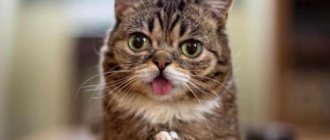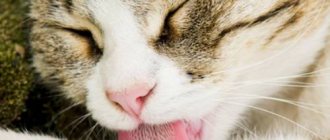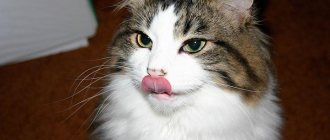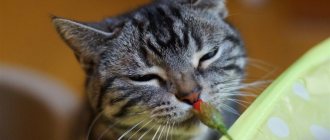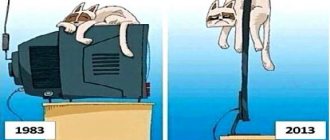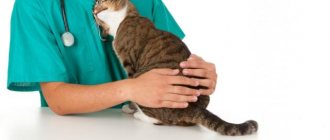Physiological reasons
In cats, as in humans, breathing through the nose is considered the physiological norm. It is not uncommon to see a cat breathing with its mouth open and its tongue hanging out like a dog. It is noticeable that with this method of breathing the abdominal muscles are involved: the cat breathes not from the chest, but from the stomach.
Nature has created a vacuum in the chest cavity around the lungs. When the pectoral muscles work while inhaling, the ribs diverge - the lungs straighten and fill with air, which enriches the blood with oxygen.
If there is a lack of oxygen, an “emergency” breathing mode is activated and the abdominal muscles are activated. The body tries to increase the amount of air inhaled - it increases breathing movements.
As soon as the oxygen level in the blood returns to normal, abdominal breathing “turns off” - the cat breathes calmly, through the chest, through the nose. If the animal does not have any pathological changes in the body, such conditions correspond to the norm and quickly pass when the negative factor is eliminated.
Natural external reasons why a cat breathes with its mouth open are:
- Hot. It is known that as the air temperature rises, the oxygen content decreases. The body's need for this element increases. The brain introduces a mode of “enhanced ventilation” - breathing becomes more frequent. Long-haired cats have a particularly hard time withstanding the heat: Maine Coons, Persians, Siberians. The owner's job is to keep the animal cool.
- Rapid breathing is often observed in cats that are obese. If a cat has suddenly gained weight, then you can often observe that the animal is breathing heavily with its mouth open. After the body adapts to the extra load or returns to normal (which is preferable), these phenomena disappear.
- After increased physical activity. Kittens are especially susceptible to this. Kids do not yet know how to regulate the load and after playing they get so tired that they “lay around without their hind legs” and often breathe with their mouths open and stick out their tongues. If the kitten breathes with an open mouth, then the reason for this may be irrepressible running and active play.
- Generic activity. During contractions and pushing, the uterus contracts, which limits the supply of oxygen to the organ. To avoid hypoxia in newborn kittens, the mother's body turns on increased breathing to protect the babies from suffocation. In this case, this is a necessary measure.
- The first time after giving birth and while feeding kittens, the cat may breathe rapidly with its mouth open, this is normal.
- Sexual hunting. During this period, the endocrine system of cats works in active mode: increased releases of sex hormones into the blood occur. Increased activity of the endocrine glands requires more oxygen - cats breathe frequently.
- Stressful situations. By frequent, heavy breathing with an open mouth, the animal’s body responds to psychological discomfort.
When these causes are eliminated, the cat quickly restores normal respiratory activity.
How can I help my cat breathe better?
Sometimes there is little you can do to help your cat breathe better. For example, if your cat has a mild form of asthma, she will likely have trouble breathing from time to time, and unless you have a prescription for medication, there is little you can do.
However, there are a few simple things you can do to help any cat breathe better, although these solutions won't always help a cat who is already having difficulty breathing.
- Avoid using diffusers, scented candles, and other products with an airy scent.
- Buy an air filter
- Make sure they have plenty of water
Pathological causes
Rapid breathing with an open mouth and protruding tongue indicates a lack of air in the cat’s body - oxygen starvation. If the natural causes of this condition have been eliminated, and the cat continues to breathe too quickly, do not hesitate, you need to show the animal to a specialist.
The reason for this may be dangerous pathological conditions.
Pulmonary edema
When they talk about pulmonary edema, they mean excessive accumulation of fluid in the tissues of the organ. This is not an independent disease, but a symptom. In cats, pulmonary edema can develop for two reasons: cardiogenic (edema is provoked by some kind of cardiac pathology) and non-cardiogenic - caused by external influences.
Non-cardiogenic causes:
- hot air entering the respiratory tract;
- reaction to medications, including anesthesia;
- allergy;
- consequences of pneumonia or asthma;
- food poisoning or inhalation of toxic fumes;
- renal failure;
- head injury with damage to the brain and its membranes;
- blood poisoning;
- sun, heatstroke or electric shock.
Pulmonary edema develops very quickly, and if urgent rescue measures are not taken, the cat may die. This condition has pronounced symptoms and is easy to identify:
- the cat suddenly loses strength and stops responding to external stimuli;
- it is noticeable that the animal is having difficulty breathing;
- the animal coughs, breathes with its mouth slightly open, sticks out its tongue;
- mucous membranes rapidly turn pale, subsequently acquiring a bluish tint;
- when coughing, pinkish sputum appears - the result of injury to the alveoli;
- the initially rapid heartbeat weakens and becomes intermittent;
- As a result of impaired peripheral circulation, the cat's paws become cold.
Accumulation of fluid or air in the chest cavity
In case of injuries that are accompanied by damage to the skin and muscle frame or rib fractures, air can enter the cat's chest cavity. It prevents the lungs from fully expanding when inhaling. This condition is called pneumothorax.
Also, as a result of injury or internal bleeding, blood can enter the chest cavity. With various pathological conditions, there may be an accumulation of other body fluids, which interferes with the normal functioning of the cat’s lungs. This condition is called hydrothorax.
A cat can get rib fractures and penetrating wounds if it falls from a height or receives a strong blow. Only a veterinarian can determine what happened to the cat and why he is breathing with his mouth open. In case of injury, you should carefully lay the animal on its side, keep it still and urgently take it to the clinic.
State of shock
Shock is a common cause of sudden hypoxia. The threatening condition develops at lightning speed, and the following situations are the reason for its occurrence:
- injury;
- poisoning;
- allergic reaction;
- long-term infectious disease.
It is possible to bring a cat out of a state of shock only in a veterinary clinic. And if it is possible to get a shock in seconds, then getting out of it can take several days.
Foreign body in the respiratory tract
If during a meal the cat stops eating and begins to snort and cough, opens its mouth, you should watch it. Perhaps a piece of food got into the respiratory tract. He will come out soon and nothing bad will happen.
Also, during play, a small object may get into the cat’s throat.
If the cough does not stop, and wheezing is heard when breathing, and inhalation and exhalation become intermittent, do not hesitate! Probably, the foreign body has penetrated deep into the respiratory tract and can completely block it.
It is strictly forbidden to shake, turn over or slap your pet on the back or other parts of the body if the cat begins to breathe with its mouth open. These measures are unlikely to help, and are quite likely to do harm. Only a specialist can cope with the problem.
Heart diseases
Rapid and heavy breathing after games or long walks is quite normal if it is short-lived and the pet recovers quickly. If a cat breathes with her mouth open too often, and even without any particular reason, this is a cause for concern.
The appearance of a bluish tint to the tongue and oral mucosa is an alarming signal.
These signs indicate the development or presence of heart failure. Hypoxia is an inevitable companion to pathologies of cardiac activity. Urgent consultation with a feline cardiologist is necessary. The sooner the owner shows the cat to the doctor, the greater the chance of preserving the health and life of the pet.
Scottish cats, Maine Coons, Abyssinians, Orientals, Cornish Rexes and Sphynxes are especially predisposed to heart pathologies.
Other pathologies
There are a number of congenital pathologies and mechanical damage that lead to the fact that the cat is forced to breathe with his mouth open:
- pathology in the structure or damage to the spinal cord;
- brain tumors that affect the respiratory center;
- helminthic infestations: some endoparasites lay eggs in the lungs;
- respiratory diseases (bronchitis, tracheitis);
- congenital pathologies of the oral cavity.
Language functions
To understand why a cat sticks out its tongue, you first need to understand what functions this muscular organ performs. A cat's tongue performs a number of important functions:
- helps in the process of swallowing, nutrition;
- allows you to recognize the taste of food;
- allows for hygiene procedures.
We suggest you read: At what age do cats lose their baby teeth?
In its normal state, the tongue is located in the mouth. But there are times when the owner complains that the cat constantly sticks his tongue out. But this phenomenon is not always considered pathological. There are also physiological reasons why a cat sticks out the tip of its tongue.
First aid
In addition to the above private signs, the cat owner’s anxiety and concern should be caused by the following symptoms, common to all conditions that threaten the pet’s life:
- the cat is apathetic and lethargic;
- frequent vomiting;
- cough is dry or with bloody sputum;
- the cat shows signs of anxiety and fear.
If these symptoms are present in addition to difficulty breathing, the most effective help for your pet will be to take him to the clinic as soon as possible or call a doctor at home. During transportation or while waiting for help, the cat should be placed on its side and, if possible, its mobility should be limited.
It should be remembered that you cannot hesitate and waste time. Prolonged hypoxia entails irreversible changes in the brain, which will lead to the death of the pet.
Why does a cat sound like he can't breathe?
There are many reasons why your cat may sound like he can't breathe. For example, if your cat is sleeping, she may simply be snoring. Allergies and mild sinus infections can also cause the nose to become partially blocked, making a whistling sound when breathing.
If your cat isn't showing signs of distress or looking like she's choking or choking, she's probably breathing. You should still check your gums to make sure they are breathing well.
If you're concerned about the sound your cat is making, even if her gums are still pink, it's a good idea to call your veterinarian. They will have a better understanding of what may be causing your cat anxiety and can use your description of the sound to decide whether you should bring your cat in for an examination.
Treatment and prognosis
Treatment is prescribed after examination and diagnosis. Depending on the reasons that caused the breathing disorder, appropriate medical procedures will be carried out with the cat.
The doctor’s first task will be to eliminate hypoxia. For this purpose, if necessary, the cat will be connected to an artificial lung ventilation device (ALV). The animal is also given drugs intravenously that enrich the blood with oxygen.
Next, after the necessary hardware tests, the cause of suffocation is eliminated. Often it is necessary to resort to surgical intervention.
The prognosis for the pet’s recovery depends on the owner’s responsibility and effective actions. The faster the cat receives effective help, the more favorable the prospects for his recovery. It all depends on the severity of the animal’s condition at the time of treatment at the clinic.
When cats breathe with their mouths open too often without a “good reason,” this should alert the owner and prompt them to consult a professional. Even a congenital disease can be taken under control and exacerbations prevented. This way you can extend the life of your family pet and make it more enjoyable.
Why does a cat open his mouth?
Just because your cat's mouth is open does not mean she is mouth breathing. Make sure your cat's belly heaves when her mouth is open. They are probably mouth breathers anyway.
But sometimes a cat opens its mouth randomly, and sometimes leaves it open for a while before closing it.
Typically, when a cat leaves its mouth open, it is because it smells something interesting and is trying to get more of that smell in order to identify it. Your cat has important scent glands in her mouth, so opening her mouth helps carry scents to her most sensitive organs.
If you've ever seen a cat react to wings, where they open their mouth wide and make strange facial expressions, this is a more exaggerated form of smelling the air with these important scent glands.
© shutterstock
What is considered normal
Natural reasons for the tongue to fall out of the mouth are forgetfulness (for example, when licking) and relaxation of the pet, when the tongue lengthens and can stick out. In addition, in stressful situations and nervous tension, the cat may clamp its tongue between its teeth. This can also be observed with an incorrect bite or in the event of a change of teeth (in kittens). It is also considered normal to bite the tongue in hot weather or during labor, when the cat is trying to alleviate pain.
Natural causes should not bother the owner
A cat with its tongue hanging out is a very cute sight, but owners of furry pets should take a closer look at the animal, especially if this behavior has been observed for a long time. If the pet shows its tongue in cases that are considered non-critical, immediately puts it in its mouth when the condition has stabilized and looks healthy and cheerful, then there is nothing to worry about.
But if it is difficult for a cat to control his tongue, and uncharacteristic changes are noted in his behavior (hoarseness of voice, difficulty breathing and lack of appetite), then it is necessary to urgently contact a veterinary clinic. If the correct diagnosis is carried out in a timely manner and emergency care is provided to the animal, this can save its life. Particular attention should be paid to baby kittens and older cats, as it is most difficult for them to point out the problem and tolerate painful conditions.
